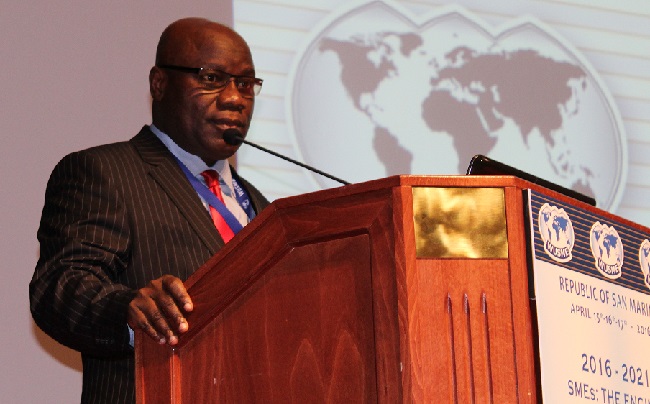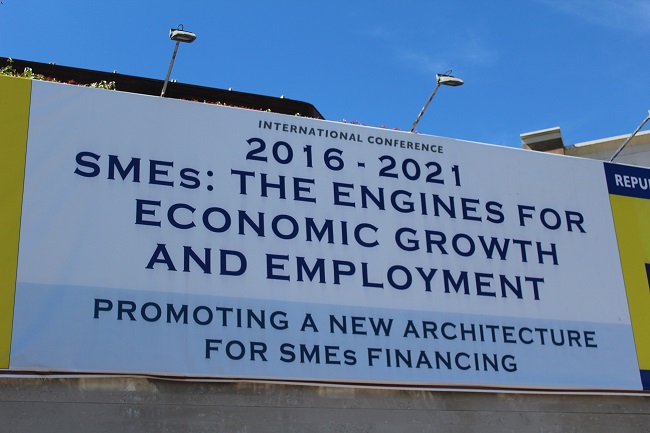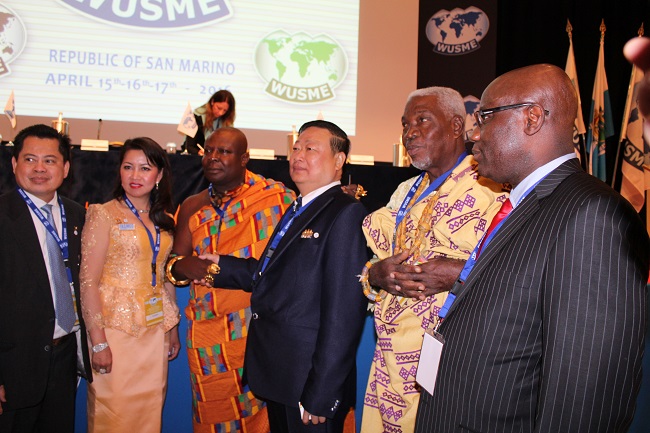Ambassador Nyenabo: Liberia on path of growth

Dr. Isaac W. Nyenabo, Liberia’s Ambassador to the Benelux, ACP and the European Union speaks on behalf of President Ellen Johnson Sirleaf at the 4th Assembly of the World Union of Small and Medium Enterprise (WUSME) held in San Marino from April 15 -17
I wish to convey goodwill and deepest appreciations to the President and organizers of this summit on behalf of Her Excellency Madam Ellen Johnson Sirleaf, President of the Republic of Liberia, the government and the people of Liberia for the warm reception accorded the Liberian delegation since our arrival in this beautiful country two days ago.
As the purpose of this summit calls on investors to discuss the funding assistance required by the SME sector in Africa and also to give African Ministers of Finance opportunity to sign loan facility, the delegation recognizes the importance to identify activities and initiatives that properly respond to the specific needs of SMEs and contribute to the implementation of solutions and reforms that can improve the business environment for SMEs in an efficient and effective way.
Our government also encourages enterpreneurship education and professional training, working closely with academic institutions in the countries to implement appropriate training programs and create effective international network of intellectual resources for the benefit of enterpreneurs around the world.
Liberia, who gained its independence in 1847, has a population of 4.5 million, with gross domestic product (GDP) of 3.7 billion 0.5% growth, 6.2% , 5 years compound annual growth, $862 per capita, unemployment 3.8%, 9.9% inflation with FDI inflows of $302.0 million (Heritage Foundation Report on GDP, Inflation, Business and Trade).
Liberia’s reform-minded government of Madam Ellen Johnson Sirleaf has managed to place the country on a path of growth despite the challenging economic environment. Reforms have dismantled some of the barriers to trade, simplified business licensing, and eased credit restrictions, contributing to an average growth rate of over 6 percent over the past five years prior to the Ebola Crisis.

Considerable effort has been made to modernize the regulatory framework. The business start-up process is more straight-forward, with no minimum capital required. The labor market is gradually developing with the larger portion still engaged in the informal activity. Following the Ebola crisis, the government subsidies for education and healthcare have yielded the desired result aimed at bringing sustained economic development to its citizens.
Liberia’s average tariff rate is 6.1 percent. Several sectors of the economy are reserved for domestic investors. The government may not expropriate property without providing compensation. The high cost of credit and scare access to financing hinder private-sector development. A large part of the population remains outside of the formal banking sector.
Distinguished Delegates
Let me remind you that countries emerging from protracted and devastating conflicts are often seen as needing significant external interventions in their financial markets to rebuild their private sector and promote quick and effective economic recovery. Despite enormous challenges, the provision of credit or the implementation of various lending schemes often dominate efforts to promote domestic private sector recovery in the immediate aftermath of conflict.
Liberia, like most post-conflict nations, was left with a destroyed private sector and a challenging financial system. These are often the first targets of parties in conflict-both to take control of the assets and to prevent the opposition from beating them to the challenge. Consequently, the private sector is left without the collateral to access finance following the cessation of conflict. Reviving institutions to provide credit, therefore, takes priority in the revival of private enterprise.
As the world economies are recovering from the financial crisis of 2008-2009, many economies urgently need to create employment opportunities for their citizens. In this respect, creation and growth of small and medium enterprises are an important item on the policy agenda of Liberia due to evidence that points to significant contributions by SMEs to employment. In addition, regulatory measures have been taken to ease access to formal financial services by SMEs. Giving the importance of SMEs in supporting sustainable, diversified, long-term economic growth, they have indeed attracted renewed-attention in the wake of the 2008-2009 financial crisis.
Despite the importance of SMEs for job creation and production, most of the SMEs literature point to the fact that small and medium firms face higher barriers to external financing than large firms, which limits their growth and development. Numerous studies that use firm-level survey data demonstrate that access to finance and the cost of credit do not only pose barriers to SMEs financing, but also constrain SMEs more than large firms. Small firms find it difficult to obtain commercial bank financing, especially long-term loans for a number of reasons, including lack of collateral, difficulties in providing credit-worthiness, small cash flows, inadequate credit–history, high risk premiums.

Ambassador Nyenabo (1st from right) and some of the delegates
My distinguished delegates, in 2013, the government of Madam Ellen Johnson Sirleaf organized a conference on small and medium enterprises and stressed the government’s continuous committment to the growth of the small and medium enterprise sector and made three major pronouncements :
1. Liberia innovation fund for enterpreneurship reflects benefit of small businesses that demonstrate the ability to innovate primarily in the sixteen sectors designated by the investment code of Liberia to have long-term competitive investment to improve their access to finance.
2. One time waiver to tax clearance procedure for fiscal year to enable small businesses to get goods and services without showing the tax clearance.
3. Compiling of small and medium enterprises directory to ensure that government exercises committment of 25% procurement of goods and services from Liberian- owned businesses.
Finally, Mr. President, organizers of this summit and delegates, we thank you again for the invitation extended us to participate in this historical excercise and are in readiness to work with you in presenting our case on small and medium enterprises during the engagement process. We are very sure that the summit will generate the desired result.
Thank you.

